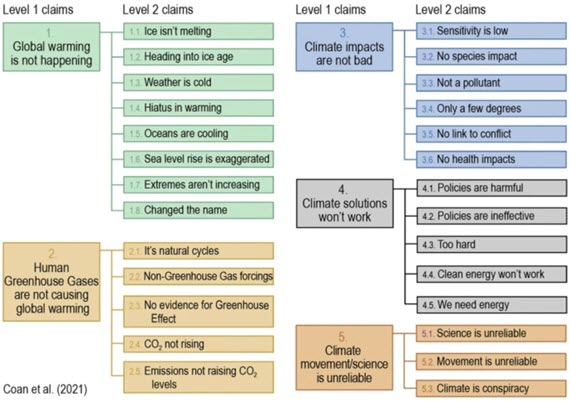
Together with Cristian Rojas, Frank Algra-Maschio, Mark Andrejevic, Travis Coan, and Yuan-Fang Li, I just published a paper in Nature Communications Earth & Environment where we use the Computer Assisted Recognition of Denial and Skepticism (CARDS) machine learning model to detect climate misinformation in 5 million climate tweets. We find over half of climate misinformation tweets involve personal attacks or conspiracy theories. This new paper builds on work published in 2021 which I wrote about in the article How machine learning holds a key to combating misinformation.
Here is the abstract of our open access paper "Hierarchical machine learning models can identify stimuli of climate change misinformation on social media":
Misinformation about climate change poses a substantial threat to societal well-being, prompting the urgent need for effective mitigation strategies. However, the rapid proliferation of online misinformation on social media platforms outpaces the ability of fact-checkers to debunk false claims. Automated detection of climate change misinformation offers a promising solution. In this study, we address this gap by developing a two-step hierarchical model. The Augmented Computer Assisted Recognition of Denial and Skepticism (CARDS) model is specifically designed for categorising climate claims on Twitter. Furthermore, we apply the Augmented CARDS model to five million climate-themed tweets over a six-month period in 2022. We find that over half of contrarian climate claims on Twitter involve attacks on climate actors. Spikes in climate contrarianism coincide with one of four stimuli: political events, natural events, contrarian influencers, or convinced influencers. Implications for automated responses to climate misinformation are discussed.
We used the taxonomy from Coan et al. (2021) where we developed the CARDS model for detecting misinformation claims. There are 5 categories of misinformation: it's not real, it's not us, it's not bad, solutions won't work, experts aren't reliable:
This taxonomy provides a comprehensive overview of the frequently employed main claim and its corresponding subarguments utilized to bolster contrarian perspectives on climate change. Source: Coan et al. (2021)
We found that spikes in climate misinformation coincided with external events - usually political events like climate legislation going through Congress or a COP summit, but also extreme weather events like Hurricane Ian.
Number of tweets related to climate change published during the second semester of 2022.
We also found misinformation spikes instigated by influencers, both contrarian influencers promoting misinformation & convinced influencers who provoked misinformation backlash. I have to confess, I never thought I'd coauthor a climate misinformation paper mentioning @RobSchneider and @RealJamesWoods!
Percentage of contrarian tweets detected by the CARDS and Augmented CARDS models.
The major take-home from this research is that 40% of climate misinformation tweets are ad hominem attacks and 20% are conspiracy theories. The majority of climate misinformation involves discrediting climate actors and eroding public trust in climate science.
Breakdown of the five most relevant categories detected by the Augmented CARDS model on Twitter in 2022. The percentages of these categories are relative to the total proportion of contrarian claims identified by the binary model.
Reference:
Rojas, C., Algra-Maschio, F., Andrejevic, M. et al. Hierarchical machine learning models can identify stimuli of climate change misinformation on social media. Commun Earth Environ 5, 436 (2024). https://doi.org/10.1038/s43247-024-01573-7
Posted by John Cook on Monday, 2 September, 2024
 |
The Skeptical Science website by Skeptical Science is licensed under a Creative Commons Attribution 3.0 Unported License. |